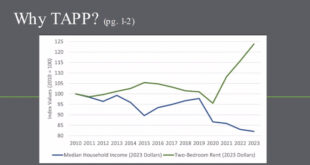Local owners securing places for good employees in CB
By Mark Reaman
What could have been a big issue with Crested Butte’s Paradise Park affordable housing project has turned into a big opportunity for some local businesses. The ten units in Phase 2 of the project are being snapped up by local business interests who want to secure housing for future employees.
As of this week, seven business owners have put down 10 percent of the cost on nine of the units, with two more businesses expressing interest in the remaining unit.
“I am super-stoked and we can move comfortably ahead with the second phase of the project,” Crested Butte community development director Michael Yerman said Monday. “I hope this turns into the model for public/private partnerships to build rental property that is desperately needed across the mountain west.”
Because only 20 people applied for the lottery to get one of the 15 affordable units in Phase 1, there was some significant doubt about moving ahead with the second phase. The town, along with project developer Joel Wisian of Bywater Development, held an informational meeting with local businesses last Tuesday, June 11. Less than a week later, 90 percent of the units were spoken for, with actual down payments in hand.
The ten units are situated in two triplexes and two duplexes. Prices range between $221,000 and $331,000 depending on the size and number of bedrooms in a unit.
Yerman had told the business people at the June 11 meeting that if the plan were to go forward, he would need definite answers by July. He got his answer sooner.
“I’m proud of our business community for stepping up and taking the lead on securing housing for their employees. I’ve always thought we could work out a plan with local businesses that would allow them to be sustainable by housing reliable employees blocks from their businesses in town,” he said. “I didn’t expect the turnout we saw on June 11 so I am totally impressed that the local business community stepped up and put money down so quickly. I am very excited that we can proceed seamlessly with Phase 2.”
Among the businesses that have signed up for the units are restaurants, contractors, property management and even a science research facility. They all meet the criteria that restrict the renters of the units to local workers and residents. Contracts are currently pending and once executed, Yerman said, the specific names of the businesses will become public.
“They all came in and were excited to be a part of this new program,” said Yerman. “They all said they couldn’t keep employees because of how hard it was for the workers to find housing up here, so they were appreciative of this opportunity to purchase units.”
The idea is to now break ground on Phase 2 this summer on the heels of the units in Phase 1 and have the ten units completed by June 2020.
The units are being sold on a first-come, first-served basis. If the demand exceeds the 10 units available, which seems likely, the model will be included into the town’s five-year housing plan for additional units to be built using this model. The council will see an amendment to the housing guideline on July 2 for how these units would be regulated and how they would function.
 The Crested Butte News Serving the Gunnison Valley since 1999
The Crested Butte News Serving the Gunnison Valley since 1999



